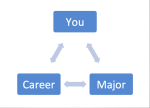I read this piece a couple of days ago, it resonated, and it keeps coming back to me.
I was initially intrigued by Fauci as an essayist. Then this passage, hit me:
“I would become all too familiar with the tactics that he had mastered to an art form: confrontation, outrageous behavior, anger and insults followed by insight, rationality, sensitivity, vulnerability, empathy and even humor.”
I’ve frequently been called conceited, “cocky,” arrogant, etc. I think the first time was by my mom, actually. She said I was “strutting around like I owned the place” on my high school campus after the jazz band had just played at the unveiling of something or another. I replied by saying, “yeah, I do that so I don’t get my ass kicked.“
Getting good at something and feigning confidence has always been my defense mechanism against the “shortest kid in the class,” “last picked on the playground,” and “bullied in high school locker room” syndromes that plagued me through my second year in high school. I do it to this day, shrouding myself in researching and scholarship, and making those things evident in my comments during committee meetings or at conferences (maybe my Patronus would actually be Hermione). I never use the tactics that Fauci ascribes to Kramer in this piece, yet somehow, I still think I get tagged with one of the following monikers: “arrogant,” “hostile,” “difficult person.”
In this post-twitter world of the 140-character “mic drop/take down” mentality, everywhere there is person-to-person interaction appears to me to be rife with the politics of meanness and a tendency toward one-upping. This has a tendency, or maybe an inevitability, to turn what would otherwise be collegial collaborators into adversaries against whom you need to win the “One and Only Best Idea” award.
I’ve recently seen colleagues do all of these things in zoom or face-to-face meetings:
- whisper asides to each other when they thought no one was looking
- try (and fail) to inconspicuously send or receive text messages (presumably from other attendees of that same meeting who also were peering into hand-held devices)
- push back on others armed only with opinion and anecdote being presented as data or statistics.
(*Full disclosure*) I may even have been guilty of that one in the middle, but never of the first or third.
I guess what I’m trying to say is that maybe we could all be better collaborators. Maybe we could watch our tone and lead with insight, rationality, and professional empathy. Maybe we could grant that those who cite research and point out their sources are not braggarts but are instead trying to highlight the contribution of the scholars to our collaborations. Maybe we could all employ the skill of improvisational listening: listening to your colleagues’ full comments in order to understand and build off of them rather than trying to identify points to counter in your response.
Anyway… these are just my thoughts… I wonder what yours are

 Finding your best path forward is a longer process than simply trusting the decision to someone (or something) else. If one enters the world of work in their early-20s and retire, like many Americans, in their mid- to late-60s, they’re going to spend over 80,000 hours working–I’d like to think it would be their preference to have a say in something to which they’ll dedicate that much time?
Finding your best path forward is a longer process than simply trusting the decision to someone (or something) else. If one enters the world of work in their early-20s and retire, like many Americans, in their mid- to late-60s, they’re going to spend over 80,000 hours working–I’d like to think it would be their preference to have a say in something to which they’ll dedicate that much time? That quote is from an article by Jane Pizzolato in the NACADA Journal from 2006. My approach has always been to engage students in their own choices and decision-making activities. My answer to the question, “what can I do with a major in…” has always been, “I don’t know, what can you do with a major in…” It is imperative to help students make meaning of the time they will spend at our institutions. It is elemental to each student’s success to empower them to choose the roads that are meaningful to them, rather than allowing them to passively follow the paths that have been chosen for them. This is not to disavow the importance of a family’s input or the norms of a student’s community–these environmental factors will be present in their reasonable sensibilities if their meaning is estimable from the student’s perspective.
That quote is from an article by Jane Pizzolato in the NACADA Journal from 2006. My approach has always been to engage students in their own choices and decision-making activities. My answer to the question, “what can I do with a major in…” has always been, “I don’t know, what can you do with a major in…” It is imperative to help students make meaning of the time they will spend at our institutions. It is elemental to each student’s success to empower them to choose the roads that are meaningful to them, rather than allowing them to passively follow the paths that have been chosen for them. This is not to disavow the importance of a family’s input or the norms of a student’s community–these environmental factors will be present in their reasonable sensibilities if their meaning is estimable from the student’s perspective.

